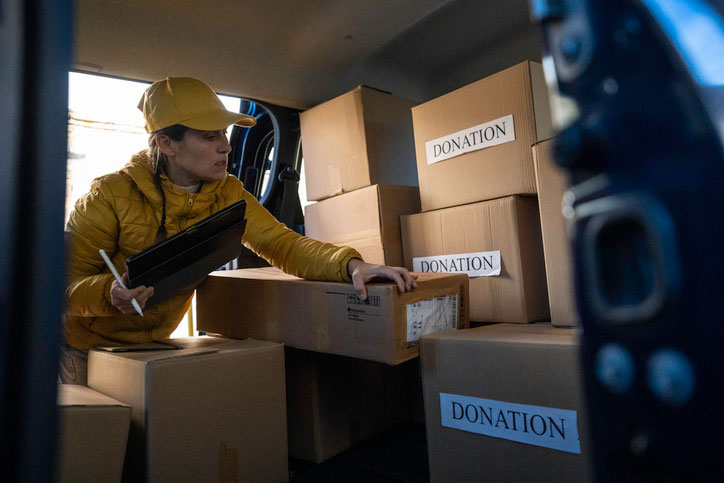Written by Scott Wilson

It’s pretty natural for anyone going into human services to be concerned about making a good living at it. You know you’ll be doing good work and finding fulfillment… but you also need to be able to pay the rent.
That’s a particular concern in a place like New York, with some of the highest costs of living anywhere on the planet. Even the New York State Comptroller reported in 2024 that over 1 million households in New York City were rent burdened, and 18 percent of rental households were behind on rent… well over the national average of 12 percent.
As a social worker, you’ll spend your days trying to fix other people’s housing and food inequities, but it’s only natural to think about your own situation too.
But not to worry. You’ll find that salaries for social workers in the Empire State keep your head well above water.
Master’s in Social Work Salary in New York vs. the Average Social Worker Salary Nationally
The first thing you need to understand about looking at social worker salaries no matter where you plan to take a job is that there is no single number to look at.
The US Bureau of Labor Statistics (BLS), which is the gold standard for American employment and salary data reporting, recognizes this fact. The BLS breaks out social work salaries into four categories based on the most common specialties and work settings found in New York.
There’s no official BLS breakdown for social worker salaries based on their level of education, but it’s pretty easy to make some estimates.
The BLS recognizes a bachelor’s in social work as the standard for entry-level jobs, while a master’s is the universal requirement for licensed roles, namely Licensed Master Social Worker (LMSW) and Licensed Clinical Social Worker (LCSW). That means that salaries for master’s-prepared LCSW and LMSWs are going to be above the median, and best represented by the 75th percentile (top 25%). That’s what we show here, along with the national average at that level for comparison:
Specialty | New York Salary | National Salary |
Child, family, and school social workers | $84,270 | $68,450 |
Healthcare social workers | $77,990 | $62,940 |
Mental health and substance abuse social workers | $92,470 | $74,810 |
All other social workers | $90,770 | $87,730 |
As you can see, New York comes out comfortably above the national average social worker salary in every category. In some cases, New York is ranked #1 in the country for social work salary rates.
Social Workers: Still in the 99 Percent
 Both New York and professional social workers played a starring role in the most seminal demonstration in the fight against income and wealth inequality. It played out on television and across the internet in one of the most famous icons of capitalist prosperity in the world: the Financial District of Lower Manhattan, home of the New York Stock Exchange and the famous Charging Bull statue.
Both New York and professional social workers played a starring role in the most seminal demonstration in the fight against income and wealth inequality. It played out on television and across the internet in one of the most famous icons of capitalist prosperity in the world: the Financial District of Lower Manhattan, home of the New York Stock Exchange and the famous Charging Bull statue.
In the wake of the bail out of big investment banks ofter the 2008 global financial crisis, against the backdrop of austerity demands over the impending debt ceiling increase in 2011, activists came together to object to the constant flow of wealth to the top 1 percent at the expense of everyone else. We are the 99 percent became the battle cry.
For 59 days in the fall of 2011, Occupy Wall Street did exactly that: a group of protesters camped in Zucotti Park, drawing attention to inequity and sparking marches around the world. The encampment was cleared in November of 2011, but the protests have continued in one form or another ever since.
Today, everyone knows where the wealth goes. The OWS protests have influenced calls for higher minimum wages across the country and have inspired renewed calls for unionization of American workers.
The Zucotti Park encampment is gone but the spirit of Occupy Wall Street is still alive in the city, throughout the state, and around the world in social workers fighting for economic equality and against the one percent everywhere.
Your Level of College Education Will Have a Real Impact on Your Earning Potential in New York

Licensed social workers in New York, by definition, have achieved at least a master’s degree. All clinical social work positions in the state require that license, and so the salaries presented above and throughout this guide are pinned to that level of education, unless otherwise noted.
But there are plenty of social work jobs that exist in New York at the macro and mezzo levels that can be filled with a bachelor’s or even an associate’s degree in social work. And plenty more where it’s not uncommon for practitioners to go all the way to a doctorate in social work.
Social Work Salary in New York with a Bachelor Degree (BSW)
So BSW and associate grads are more likely to be looking at the lower quarter or so of salaries. The 25th percentile (bottom 25%) to median range for 2023, was:
- Child, Family, and School Social Workers: $56,820 - $67,370
- Healthcare Social Workers: $48,540 - $64,050
- Mental Health and Substance Abuse Social Workers: $59,980 - $92,470
- All Other Social Workers: $68,190 - $81,550
Doctorate in Social Work Salary (PhD and DSW)
There’s also the other end of the spectrum to think about: people who have gone on to the highest levels of study through DSW and PhD in Social Work degree programs. They are more likely to fall at the upper end of the scale, within the top 10% of salaries. It’s worth noting that what you see here is the minimum salary for the top 10%, so with a doctorate you can expect to earn at these levels or higher:
- Child, Family, and School Social Workers - $106,690
- Healthcare Social Workers - $95,380
- Mental Health and Substance Abuse Social Workers - $133,270
- All Other Social Workers - $104,980

Specialization in certain social work occupations also follows through to the industry you work in. There can be some general alignment between specialties and industries—for example, healthcare social workers are pretty likely to be working for hospitals and clinics, so there’s going to be an overlap in their average salaries.
But it’s also the case that social workers in almost every category have employment opportunities in many industries. There are, for example, plenty of mental health and substance abuse social workers who also work in healthcare settings like the staff at NYC Health + Hospitals. And all kinds of social workers may be found in various government agencies.
The industries shown here align with popular specialty areas like school social work or healthcare and medical social work. It’s worth noting that the BLS figures shown here represent the average for New York, while the expectation is that MSW-prepared LMSWs and LCSWs would earn more:
- Federal government - $93,870
- Colleges, universities, and professional schools - $79,630
- Hospitals - $77,750
- Offices of Physicians - $68,000
- Finance and Insurance - $65,720
Of course, those top salaries can also be unlocked with an MSW through experience as an LMSW or LCSW. Spend enough time in the field and build a reputation for expertise in your practice area, and six-figure incomes are not out of the question.
How Salary Ranges Differ in New York by Specialty and Setting: School, Mental Health, & Medical Social Worker Salary, and More
The BLS further breaks out salaries for New York social workers according to industry. The range here shows the bottom 25% to top 10% salaries for school social workers, healthcare and medical social workers, as well as clinical social workers who specialize in mental health and substance use disorder treatment:
- Child, Family, and School Social Workers: $56,820 - $106,690
- Healthcare Social Workers: $48,540 - $95,380
- Mental Health and Substance Abuse Social Workers: $59,980 - $133,270
- All Other Social Workers: $68,190 - $104,980
Clinical Social Worker Salary in New York

In New York, as elsewhere, clinical social worker salaries tend to be among the highest. Getting to a place where you can earn those kinds of salaries means taking the most rigorous path into the profession. In New York, that means earning an MSW and qualifying for the LMSW license, and then going on to complete three years of supervised experience in preparation to become a Licensed Clinical Social Worker (LCSW).
After all that experience and vetting, you’ll be well-versed in providing clinical evaluations and direct individual and group counseling, the skills that define clinical practice in social work. Of course, evaluations and counseling services can take place in virtually any setting, but in certain roles it’s fundamental to the job. As such, you’ll find that in hospitals, mental health clinics, and substance use disorder treatment programs and facilities in New York, an LCSW is the standard credential.
In New York, the median – 90th percentile clinical social worker salary looked like this in 2023:
- Healthcare Social Workers: $48,540 - $95,380
- Mental Health and Substance Abuse Social Workers: $59,980 - $133,270
Social Worker Salary in NYC, and How Salaries Differ Around the State

There’s a constant low-grade feud between upstate and downstate New Yorkers over who has it better. There is a rule of thumb that you’re probably already aware of at a nearly genetic level: the closer you get to NYC, the higher the salaries; but the further away, the lower the costs.
Choices about which matches your preference will be a personal matter. But you will want to take a look at the average salaries for the various metropolitan and non-metropolitan areas around the state before you make a decision. Here are some of the bigger regions, with the range shown between the averages and top 10%. Again, with a master’s in social work and LMSW or LCSW license, you can expect to earn at the higher end of the scale. And again, that top end figure is the minimum at that level, with salaries only going up from there:
New York City
- Child, Family, and School Social Workers: $78,610 - $114,300
- Healthcare Social Workers: $69,870 - $100,300
- Mental Health and Substance Abuse Social Workers: $98,480 - $189,590
Albany, Schenectady, & Troy
- Child, Family, and School Social Workers: $68,750 - $91,300
- Healthcare Social Workers: $56,910 - $79,570
- Mental Health and Substance Abuse Social Workers - $69,670 - $84,590
Buffalo, Cheektowaga, & Niagara Falls
- Child, Family, and School Social Workers: $64,120 - $82,660
- Healthcare Social Workers: $56,500 - $77,870
- Mental Health and Substance Abuse Social Workers: $67,400 - $84,970
Ithaca
- Child, Family, and School Social Workers: $67,980 - $89,810
- Healthcare Social Workers: $54,970 - $77,570
- Mental Health and Substance Abuse Social Workers: $85,160 - $107,090
Rochester
- Child, Family, and School Social Workers: $63,600 - $83,730
- Healthcare Social Workers: $50,230 - $72,720
- Mental Health and Substance Abuse Social Workers: $62,680 - $81,660
Syracuse
- Child, Family, and School Social Workers: $63,840 - $80,430
- Healthcare Social Workers: $59,520 - $81,940
- Mental Health and Substance Abuse Social Workers: $64,730 - $83,010
Watertown
- Child, Family, and School Social Workers: $58,940 - $85,830
- Healthcare Social Workers: $49,150 - $69,580
- Mental Health and Substance Abuse Social Workers: $56,140 - $75,620
Capital/Northern New York nonmetropolitan area
- Child, Family, and School Social Workers: $58,140 - $75,610
- Healthcare Social Workers: $59,350 - $79,700
- Mental Health and Substance Abuse Social Workers: $64,080 - $82,800
As you can see, there’s not a consistent pattern, either—some specialties are simply worth more in different parts of the state. That’s valuable information to consider whether you’re still exploring degree options or thinking about where you prefer to live.
While you can’t really separate your compensation from the lifestyle you can afford when you live in one of the five boroughs, as a social worker you have a lot of room to lean in to real NYC living. It’s a nearly unparalleled place for living close to the populations you are working with. People that love it, love it.
For the rest, there’s always Schenectady.
While social work isn’t a field that anyone chooses because of the money, it’s nice to know that salaries in the New York region reward your good works with fair compensation.
2023 US Bureau of Labor Statistics salary and employment figures for Social Workers reflect state data, not school-specific information. Conditions in your area may vary. Data accessed April 2024.
